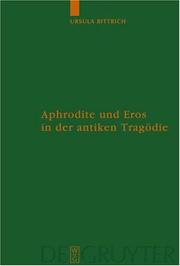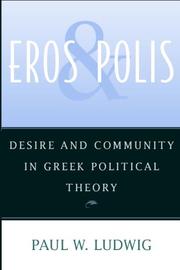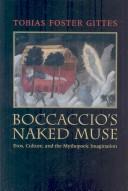| Listing 1 - 6 of 6 |
Sort by
|
Book

ISBN: 9783110641585 3110641585 Year: 2020 Publisher: Berlin Boston
Abstract | Keywords | Export | Availability | Bookmark
 Loading...
Loading...Choose an application
- Reference Manager
- EndNote
- RefWorks (Direct export to RefWorks)
Apuleius' tale of Cupid and Psyche has been popular since it was first written in the second century CE as part of his Latin novel Metamorphoses. Often treated as a standalone text, Cupid and Psyche has given rise to treatments in the last 400 years as diverse as plays, masques, operas, poems, paintings and novels, with a range of diverse approaches to the text.Apuleius' story of the love between the mortal princess Psyche (or "Soul") and the god of Love has fascinated recipients as varied as Romantic poets, psychoanalysts, children's books authors, neo-Platonist philosophers and Disney film producers. These readers themselves produced their own responses to and versions of the story. This volume is the first broad consideration of the reception of C&P in Europe since 1600 and an adventurous interdisciplinary undertaking. It is the first study to focus primarily on material in English, though it also ranges widely across literary genres in Italian, French and German, encompassing poetry, drama and opera as well as prose fiction and art history, studied by an international team of established and young scholars.Detailed studies of single works and of whole genres make this book relevant for students of Classics, English, Art History, opera and modern film.

ISBN: 3110185555 3110923904 Year: 2005 Volume: Bd. 75 Publisher: Berlin de Gruyter
Abstract | Keywords | Export | Availability | Bookmark
 Loading...
Loading...Choose an application
- Reference Manager
- EndNote
- RefWorks (Direct export to RefWorks)
Aphrodite and Eros - the portrayal of these two gods and the depiction of their active intervention have a significant impact on the plots of numerous classical tragedies. Focussing upon a selection of dramas from Aeschylus to Seneca, the author demonstrates how the images of these two multifaceted gods have been transmitted and altered, at the same time that certain features have been preserved. The tension between a powerful Aphrodite, working on a cosmic scale, and a goddess whose influence is restricted to matters of personal love relationships - as it emerges from a survey of relevant passages in early epic texts - is palpable in tragedy as an oscillation between a goddess presented as a mighty authority, whose existence is never really questioned, and a conventional name devoid of substance, which is invoked only as an excuse. The emphasis on the destructive side of the twofold love gods is shown to be characteristic of tragedy. This is demonstrated particularly with regard to the motif of divine anger, which serves also as starting point for the concluding reflections on Theocritus, Ovid and Nonnus. Aphrodite und Eros - das Wesen und Wirken dieses Göttergespanns ist richtungweisend für den Handlungsablauf zahlreicher antiker Tragödien. Die Autorin zeigt an ausgewählten Dramen von Aischylos bis Seneca, wie sich das Bild dieser beiden so facettenreichen Gottheiten unter Wahrung bestimmter Konstanten tradiert und gewandelt hat. Der spannungsreiche Wechsel zwischen einer kraftvoll waltenden Aphrodite mit kosmischer Wirksamkeit und der auf Liebesdinge beschränkten Bereichsgöttin, der bei einer vergleichenden Betrachtung relevanter Passagen aus frühen epischen Texten zutage tritt, wird in der Tragödie als das Oszillieren zwischen einer vollmächtig auftretenden, in ihrer Existenz unangezweifelten Gottheit und einer nurmehr zu Entschuldigungszwecken herangezogenen traditionellen Hülse fassbar. Als charakteristisch für die Tragödie erweist sich der Ton auf der destruktiven Kehrseite der doppelgesichtigen Liebesgottheiten. Sie findet eine Sonderausprägung im Motiv des Götterzorns, das den Ausgangspunkt zu den abschließenden Betrachtungen über Theokrit, Ovid und Nonnos bildet.
Aphrodite (Greek deity) in literature --- Classical poetry --- Eros (Greek deity) in literature --- History and criticism --- Aphrodite (Greek deity) in literature. --- Eros (Greek deity) in literature. --- History and criticism. --- Eros --- In literature. --- Eρως --- Phanes --- Erot --- Эрот --- Ерос --- Eroso --- Earós --- 에로스 --- Erosŭ --- ארוס --- Эрос --- Erots --- Erotas --- Erósz --- エロース --- Erosi --- 厄洛斯 --- Eluosi --- Cupid
Book
ISBN: 9780691632308 0691632308 0691602859 0691014493 1400857953 0691247935 Year: 2017 Publisher: Princeton (N.J.) : Princeton University Press,
Abstract | Keywords | Export | Availability | Bookmark
 Loading...
Loading...Choose an application
- Reference Manager
- EndNote
- RefWorks (Direct export to RefWorks)
The insights presented in the volume are many and wide-ranging, recognizably in tune with the subtlest modern discussions of desire (such as triangulation. or loving what others love), yet offering new solutions to old problems, like the proper interpretation of Plato's Phaedrus. On the frequently discussed effect of literacy on Greek civilization, the book offers a fresh view: it was no accident that the poets who invented Eros were also the first readers and writers of the Western literate tradition.Originally published in 1986.The Princeton Legacy Library uses the latest print-on-demand technology to again make available previously out-of-print books from the distinguished backlist of Princeton University Press. These editions preserve the original texts of these important books while presenting them in durable paperback and hardcover editions. The goal of the Princeton Legacy Library is to vastly increase access to the rich scholarly heritage found in the thousands of books published by Princeton University Press since its founding in 1905.
Love. --- Eros, --- Love in literature. --- Greek literature --- Affection --- Emotions --- First loves --- Friendship --- Intimacy (Psychology) --- History and criticism. --- Eros --- Eρως --- Phanes --- Erot --- Эрот --- Ерос --- Eroso --- Earós --- 에로스 --- Erosŭ --- ארוס --- Эрос --- Erots --- Erotas --- Erósz --- エロース --- Erosi --- 厄洛斯 --- Eluosi --- Cupid --- In literature.
Book
ISBN: 1787441717 1571139788 Year: 2017 Publisher: Rochester : Camden House,
Abstract | Keywords | Export | Availability | Bookmark
 Loading...
Loading...Choose an application
- Reference Manager
- EndNote
- RefWorks (Direct export to RefWorks)
New essays exploring the resurgence of the theme of romantic relationships and love in German literature since around the turn of the millennium.
German literature --- Love in literature. --- History and criticism. --- Eros --- Eρως --- Phanes --- Erot --- Эрот --- Ерос --- Eroso --- Earós --- 에로스 --- Erosŭ --- ארוס --- Эрос --- Erots --- Erotas --- Erósz --- エロース --- Erosi --- 厄洛斯 --- Eluosi --- Cupid --- In literature. --- Desire. --- Feminist. --- Films. --- German literature. --- Intersubjective. --- LGBTQ politics. --- Literature. --- Love relationships. --- Romantic relationships. --- Urban sexuality.

ISBN: 0521810655 9780521810654 0511064284 9780511064289 0511072740 9780511072741 0511057954 9780511057953 9780511497773 0511497776 9780521031431 0521031435 110713241X 1280418451 0511330324 1139147722 0511177909 Year: 2002 Publisher: Cambridge, UK New York Cambridge University Press
Abstract | Keywords | Export | Availability | Bookmark
 Loading...
Loading...Choose an application
- Reference Manager
- EndNote
- RefWorks (Direct export to RefWorks)
Eros and Polis examines how and why Greek theorists treated political passions as erotic. Because of the tiny size of ancient Greek cities, contemporary theory and ideology could conceive of entire communities based on desire. A recurrent aspiration was to transform the polity into one great household that would bind the citizens together through ties of mutual affection. In this study, Paul Ludwig evaluates sexuality, love and civic friendship as sources of political attachment and as bonds of political association. Studying the ancient view of eros recovers a way of looking at political phenomena that provides a bridge, missing in modern thought, between the private and public spheres, between erotic love and civic commitment. Ludwig's study thus has important implications for the theoretical foundations of community.
Eros (Greek deity). --- Homosexuality --- Political science --- Sex --- Political aspects --- History. --- Science politique --- Homosexualité --- Sexualité --- Eros (Divinité grecque) --- Histoire --- Aspect politique --- Eros --- Gender (Sex) --- Human beings --- Human sexuality --- Sex (Gender) --- Sexual behavior --- Sexual practices --- Sexuality --- Sexology --- Same-sex attraction --- Sexual orientation --- Bisexuality --- Eρως --- Phanes --- Erot --- Эрот --- Ерос --- Eroso --- Earós --- 에로스 --- Erosŭ --- ארוס --- Эрос --- Erots --- Erotas --- Erósz --- エロース --- Erosi --- 厄洛斯 --- Eluosi --- Cupid --- Eros (Greek deity) --- Arts and Humanities --- History

ISBN: 0802092047 1442687460 9781442687462 9780802092045 1442691433 Year: 2008 Publisher: Toronto, Ont. University of Toronto Press
Abstract | Keywords | Export | Availability | Bookmark
 Loading...
Loading...Choose an application
- Reference Manager
- EndNote
- RefWorks (Direct export to RefWorks)
"Boccaccio's Naked Muse examines a writer who cast himself as the apostle of a new humanistic faith, one that would honour God by exalting his creation. In this study, Tobias Foster Gittes argues that Boccaccio did not simply reproduce Golden Age schemes in his works, but rather subtly altered and adapted them to produce a model of human beatitude more suited to his conviction that cultural achievement and human dignity are indissolubly linked."--Jacket.
Culture in literature. --- Eros (Greek deity) in literature. --- Myth in literature. --- Boccaccio, Giovanni, --- Criticism and interpretation. --- Eros --- In literature. --- Eρως --- Phanes --- Erot --- Эрот --- Ерос --- Eroso --- Earós --- 에로스 --- Erosŭ --- ארוס --- Эрос --- Erots --- Erotas --- Erósz --- エロース --- Erosi --- 厄洛斯 --- Eluosi --- Cupid --- Boccaccio, Giovanni --- Boccaccio, Jean --- Boccace --- Bocace, Jean, --- Bocacio, Juan, --- Boccace, --- Boccace, Jean, --- Boccacius, Ioannes, --- Boccacius, Joannes, --- Boccatius, Ioannes, --- Boccatius, Joannes, --- Bochas, John, --- Bokachʻchʻo, Jiovanni, --- Bokachʻio, Jiovanni, --- Bokkachchʹo, Dzhʹovanni, --- Bokkachio, Dzhiovanni, --- Vocacio, Juan, --- Боккаччо, Дж, --- באקאשטיא, --- באקאטשא, דזשעאוואני, --- באקאטשיא --- באקאטשיא, --- בוקאצ׳ו, ג׳ובאני --- Bocace, Jean --- Bocacio, Juan --- Boccace, Jean --- Boccacius, Ioannes --- Boccacius, Joannes --- Boccatius, Ioannes --- Boccatius, Joannes --- Bochas, John --- Bokachʻchʻo, Jiovanni --- Bokachʻio, Jiovanni --- Bokkachchʹo, Dzhʹovanni --- Bokkachio, Dzhiovanni --- Vocacio, Juan --- Боккаччо, Дж --- Thematology --- Eros (Greek deity)--in literature.
| Listing 1 - 6 of 6 |
Sort by
|

 Search
Search Feedback
Feedback About UniCat
About UniCat  Help
Help News
News